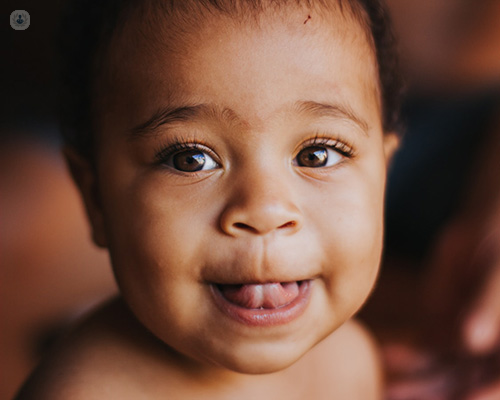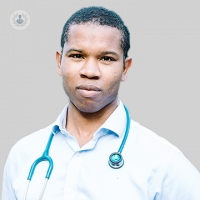Baby wheezing: should I be worried?
Written in association with:Noisy breathing in babies and young children is often a cause for concern for parents. Children make a variety of breathing noises, many of which people think of as wheezing but few actually are. Most are not cause for concern and even if your child does wheeze this does not automatically mean that they have asthma.
We’ve asked one of our top respiratory paediatricians, Dr Chinedu Nwokoro for his specialist opinion on the possible causes of wheezing in babies and when it’s time to visit the doctor.

Should I be worried about my baby wheezing?
The short answer in most cases is probably not. At least 1 in 3 children will wheeze before they start school and very few have anything to worry about. Babies, in their first year of life, are more vulnerable to wheezing, especially if they were born very early or very small, or have other medical problems. Even then, most of them are fine.
How can I tell if my baby is wheezing?
Good question. Doctors often add to the confusion by not being specific about what we mean. When chest doctors talk about wheeze, we mean a ‘musical sound’ coming from inside the chest and not the throat. It is heard more on breathing out than when breathing in and often is only heard with a stethoscope.
It is important not to confuse ‘rattley’ (mucous/phlegmy) or croupy/stridulous (from the throat on breathing in) breath sounds with wheezing, as the diagnoses and treatments are often very different. If you’re not sure then I would be happy to help.
What are the possible causes of baby wheezing?
Once we’re sure that we are dealing with wheeze and no stridor, rattles or croup, then we can think about the cause.
In the under one-year-old, the most common cause by far is viral infection leading to a cold (viral secretions in the upper airways, ears, nose and throat) or bronchiolitis (viral secretions in the lower airways).
These will usually get better within a week or two with minimal, supportive treatment only, such as paracetamol and keeping their nostrils clear with nasal aspirators and nasal saline spray. It is also recommended to make sure your baby doesn’t get too dehydrated and maintaining breast or bottle feeds is usually enough as babies may feed for shorter periods and more often.
There is no evidence for inhalers or nebulisers in most of these cases. There are other causes of wheeze in this age group but if they get better with the above then you don’t need to worry. If you feel you have cause to worry then please see your usual doctor.
When should I take my baby to see a doctor?
If your baby wheezes when they don’t have a virus, or they don’t get better with the treatment described then they may have more severe bronchiolitis, or they may have another condition that causes or worsens their wheezing. Repeated severe wheeze or wheeze that doesn’t get better as described can rarely be a warning sign for other medical problems.
If your wheezing baby is getting lethargic or floppy, stopping breathing, turning blue or feeding less than half to two thirds than expected (perhaps from breathing difficulty or from vomiting), or doing anything else that worries you then you should see your doctor urgently.
If your baby gets frequent wheezing episodes, especially if they happen even when they don’t have a cold, then they may need additional treatment or investigation. Discussion with your GP may be reassuring or may prompt onward referral to a paediatric or paediatric respiratory specialist.
How is baby wheezing treated?
If your baby wheezes due to a viral cold or mild bronchiolitis then all that is usually needed is the so-called supportive treatment described with nasal clearance, temperature control and good hydration.
If a child is admitted to hospital, they may need intravenous or nasal tube fluid support, oxygen, or even breathing support with a machine called a ventilator. Older children who wheeze frequently with colds may need inhaled treatments with medicines like those used to treat asthma. Those with underlying causes for their wheezing may need targeted treatment for those conditions. This is where specialist input is critical.
As a parent, or even a GP, it is important to recognise when a baby or child falls outside of the ’normal’ patterns I have described above and to stay calm, relaxed and reassured as long as they don’t.
If either you or your GP are unsure then I am happy to help and you can book an appointment via my Top Doctor's profile now.



